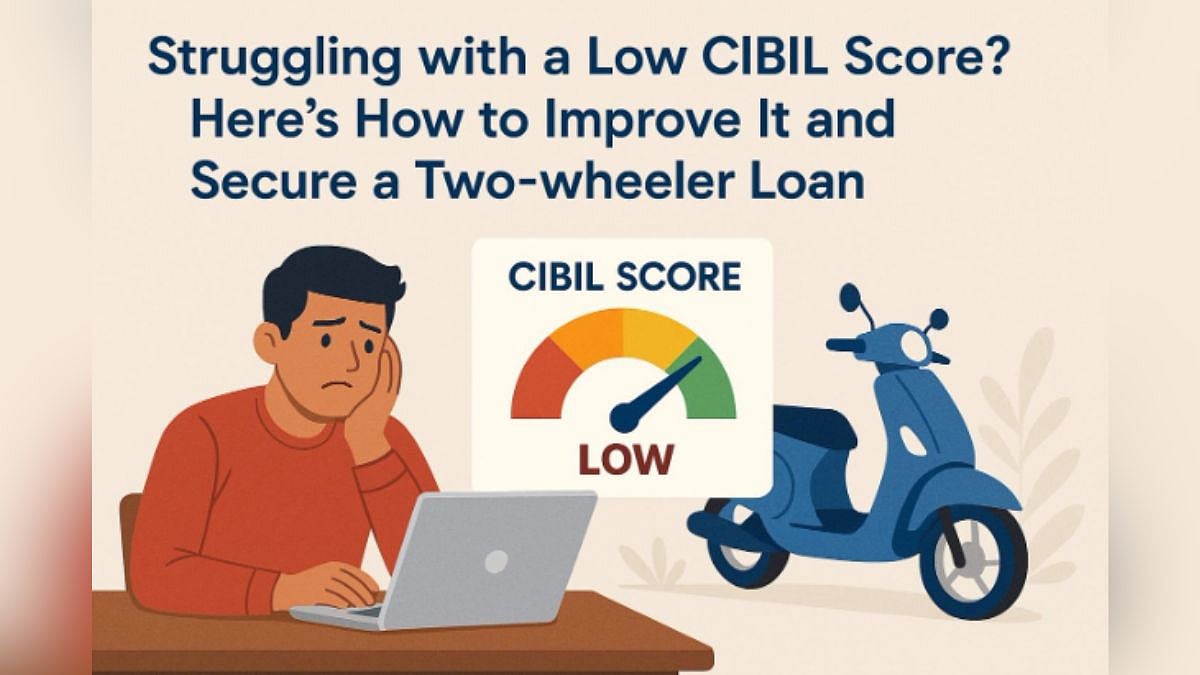Struggling With A Low CIBIL Score? Here’s How To Improve It & Secure A Two-Wheeler Loan |
A low CIBIL score can be a major hurdle when applying for a two-wheeler loan. It can impact your chances of getting approval or securing a favourable interest rate. However, all is not lost. If you’re facing a low CIBIL score, there are several steps you can take to improve it and increase your chances of obtaining a loan.
What is a CIBIL Score
Your CIBIL score, or Credit Information Bureau (India) Limited score, is a three-digit number that reflects your creditworthiness. It is based on your credit history and behaviour, such as how well you’ve repaid past loans and credit cards. CIBIL scores range from 300 to 900. The higher your CIBIL score for bike loan, the better your chances of getting approvals at favourable terms.
Why Does Your CIBIL Score Matter for a Two-Wheeler Loan
Lenders use your CIBIL score to assess your creditworthiness. A high score indicates a strong history of managing credit and suggests you are less likely to default. A low score, on the other hand, raises concerns about your ability to repay, making it more difficult to get loan approval or secure the.
How to Boost Your CIBIL Score for a Two-Wheeler Loan
If you find yourself with a low CIBIL score, there are effective ways to improve it over time. While it takes patience, following these steps can help raise your score and increase your chances of loan approval.
Check Your Credit Report for Errors
Sometimes, discrepancies in your credit report can affect your CIBIL score. It’s important to check your credit report regularly. If you spot any errors, such as incorrect details of credit accounts or payments, you can file a dispute with CIBIL for correction. This will ensure your score accurately reflects your credit behaviour.
Pay Your Bills and EMIs on Time
One of the biggest factors affecting your CIBIL score is your payment history. Consistently paying your bills, including credit card payments and EMIs, on time is crucial. Late or missed payments can have a negative impact on your score. Set reminders or automate your payments to avoid delays and improve your credit history.
Reduce Your Credit Utilisation Ratio
Credit utilisation refers to the percentage of your available credit that you are currently using. A high credit utilisation ratio can lower your CIBIL score. Ideally, try to keep your credit utilisation below 30%. If you are using a significant portion of your credit limit, consider paying off some of your outstanding balances to bring your credit utilisation ratio down.
Avoid Opening Multiple Credit Accounts
Opening too many credit accounts within a short period can negatively affect your CIBIL score. Each time you apply for credit, a hard inquiry is made, which can lower your score slightly. It’s a good idea to apply for credit only when necessary and ensure that you have a good reason for each application.
Clear Outstanding Debts
If you have existing debts, particularly those that are overdue, it’s important to clear them. Outstanding debts contribute to a low score and can make it difficult to get approved for a loan. Start by paying off smaller debts and work your way up to larger ones. This will help demonstrate your ability to manage credit responsibly.
Consider a Secured Credit Card
If you’re finding it difficult to improve your CIBIL score, consider applying for a secured credit card. This is a type of credit card backed by a fixed deposit (FD). Using a secured credit card responsibly, by making timely payments and keeping your credit utilisation low, can help rebuild your credit score over time.
Maintain a Healthy Credit Mix
A healthy credit mix – a combination of different types of credit, such as personal loans, credit cards, and retail loans – can help boost your CIBIL score. However, don’t take on more credit than you can manage. Only take out credit when needed, and aim to use a variety of credit responsibly to improve your score.
How Long Will It Take to Improve Your CIBIL Score
Improving your CIBIL score isn’t an overnight process. It requires consistent effort, patience, and time. Depending on your current score and the changes you make to your credit behaviour, it can take a few months to see significant improvement. However, don’t be discouraged. Even small changes, such as paying off a portion of your debt or reducing your credit utilisation, can gradually boost your score.
Additional Tips to Help Your Loan Application
When , your CIBIL score isn’t the only factor lenders consider. Other factors include your income, existing debts, and the loan amount you are applying for. To increase your chances of approval, ensure that your income is stable and that your existing debts are manageable. It may also help to consider applying with a co-applicant if needed.
Conclusion
A low CIBIL score doesn’t mean you’re locked out of getting a two-wheeler loan. By following the steps mentioned above, you can gradually improve your score. Paying attention to your payment history, managing credit responsibly, and regularly checking your credit report will go a long way in boosting your score. While it takes time, improving your CIBIL score can lead to better loan terms and a smoother approval process for your two-wheeler loan.
